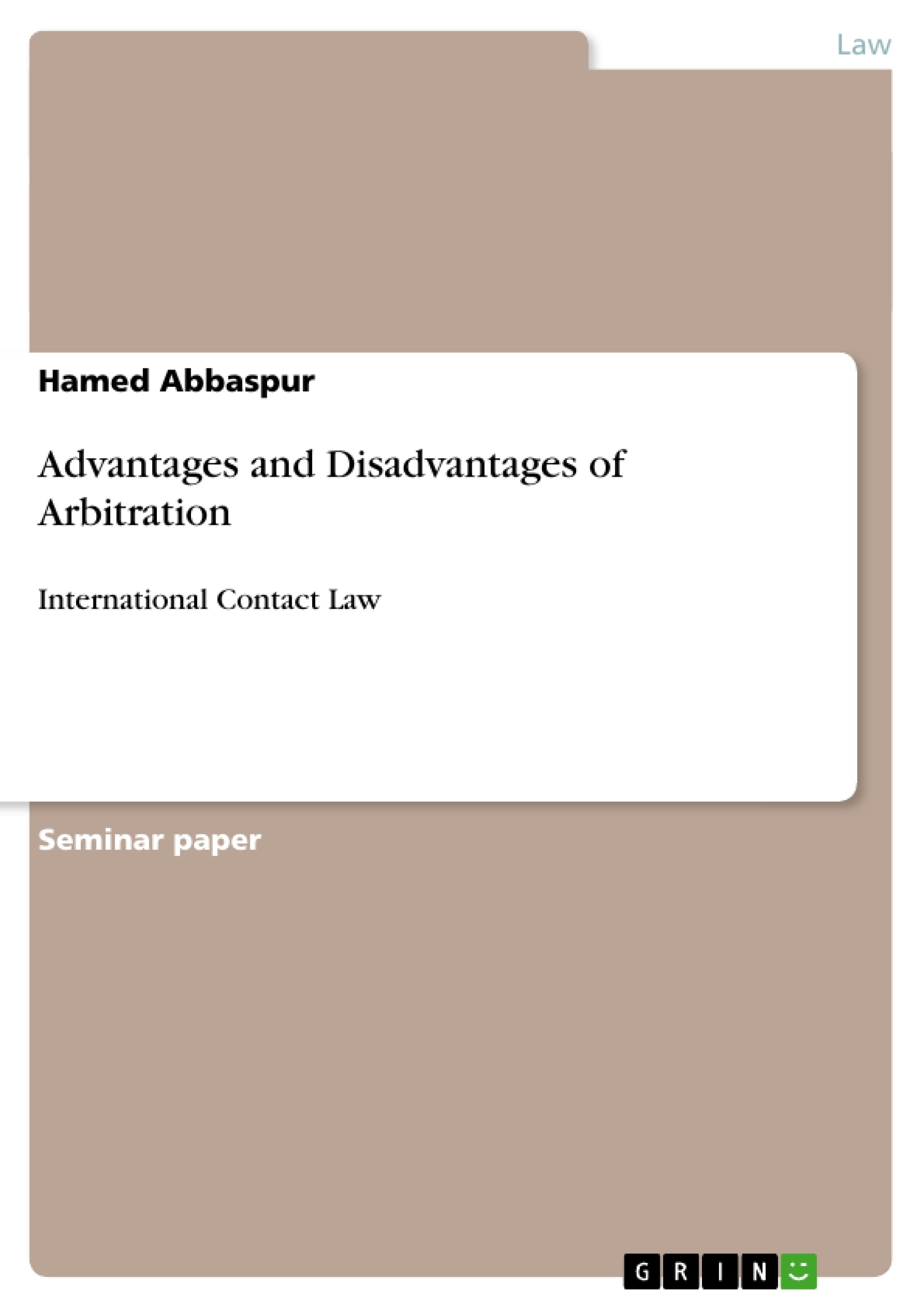In the last three decades, international arbitration has experienced a remarkable growth and become an important and widely used instrument in the resolution of international disputes. This paper deals with the main advantages and disad-vantages of arbitration in the context of international contract law and is based primarily on two references: the textbook The Principles and Practice of Interna-tional Commercial Arbitration, by Margaret L. Moses (2008), and the homepage of The International Chamber of Commerce (2013).
Table of Contents
- Advantages of Arbitration
- Process flexibility
- Choice of arbitrators
- Neutrality
- Confidentiality
- Final and binding decisions
- Recognition and enforcement of awards
- Time and costs
- Disadvantages of Arbitration
- References
Objectives and Key Themes
This paper aims to analyze the advantages and disadvantages of arbitration within the context of international contract law. It primarily draws upon "The Principles and Practice of International Commercial Arbitration" and the International Chamber of Commerce's website. The analysis focuses on providing a balanced overview of arbitration as a dispute resolution mechanism.
- Flexibility and Party Autonomy in Arbitration Procedures
- Neutrality and Impartiality in International Dispute Resolution
- Cost and Time Efficiency Compared to Litigation
- Enforcement of Arbitral Awards on an International Scale
- Confidentiality as a Commercial Advantage of Arbitration
Chapter Summaries
Advantages of Arbitration: This chapter explores the key benefits of arbitration in international contract law. It emphasizes party autonomy, allowing parties to tailor the process to their needs, including choosing arbitrators with specific expertise and selecting the place, language, and applicable law. The chapter highlights the neutrality offered by arbitration, avoiding home-country advantages, and the crucial aspect of confidentiality, protecting sensitive business information. Furthermore, it underscores the finality and enforceability of arbitral awards, facilitated by the New York Convention, and contrasts this with the potentially lengthy and costly nature of court proceedings. The chapter concludes by emphasizing the time and cost-effectiveness of arbitration, particularly due to the streamlined procedures and avoidance of multiple court jurisdictions.
Disadvantages of Arbitration: [Note: The provided text does not contain a chapter dedicated to the disadvantages of arbitration. A summary cannot be provided for a missing chapter.]
Keywords
International arbitration, international contract law, dispute resolution, party autonomy, neutrality, confidentiality, cost-effectiveness, enforceability of awards, New York Convention, time efficiency.
Frequently Asked Questions: A Comprehensive Language Preview
What is the purpose of this document?
This document provides a comprehensive preview of a paper analyzing the advantages and disadvantages of arbitration in international contract law. It includes a table of contents, objectives and key themes, chapter summaries, and keywords.
What topics are covered in the Table of Contents?
The table of contents lists the Advantages of Arbitration (including process flexibility, choice of arbitrators, neutrality, confidentiality, final and binding decisions, recognition and enforcement of awards, and time and costs), Disadvantages of Arbitration, and References.
What are the main objectives and key themes of the paper?
The paper aims to analyze the advantages and disadvantages of arbitration in international contract law, focusing on providing a balanced overview. Key themes include flexibility and party autonomy in arbitration procedures, neutrality and impartiality, cost and time efficiency compared to litigation, enforcement of arbitral awards internationally, and confidentiality as a commercial advantage.
What are the advantages of arbitration discussed in the paper?
The advantages discussed include party autonomy (allowing tailored processes, choice of arbitrators, place, language, and applicable law), neutrality, confidentiality, the finality and enforceability of awards (facilitated by the New York Convention), and time and cost-effectiveness compared to litigation.
What about the disadvantages of arbitration?
The provided text does not contain a chapter dedicated to the disadvantages of arbitration; therefore, a summary of disadvantages cannot be provided.
What keywords are associated with this paper?
Keywords include international arbitration, international contract law, dispute resolution, party autonomy, neutrality, confidentiality, cost-effectiveness, enforceability of awards, New York Convention, and time efficiency.
What sources are referenced in the paper?
The preview explicitly mentions "The Principles and Practice of International Commercial Arbitration" and the International Chamber of Commerce's website as primary sources.
Where can I find more information?
This is a preview; the full paper would provide more detailed information on the advantages and disadvantages of arbitration.
- Quote paper
- Hamed Abbaspur (Author), 2013, Advantages and Disadvantages of Arbitration, Munich, GRIN Verlag, https://www.grin.com/document/263550




